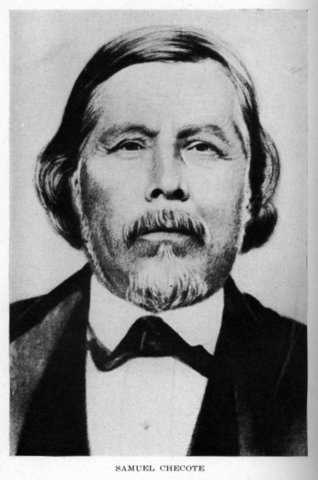Samuel Chocote, Principal Chief
Samuel Checote, born in the Chattahoochee valley in Alabama in 1819, came with his parents to the old Indian Territory in 1829. He was a full blood Creek Indian, of the Lower Creek or McIntosh faction.
His parents settled west of Okmulgee but passed away within a few years after their removal. At the age of nine years, he was sent to the Asbury Manual Labor School near Ft. Mitchel, Alabama, and after the removal, he attended Harrell’s academy at Muskogee.
Early in life, he became a member of the Methodist Church and later entered the ministry of that denomination. He is a concrete evidence of how completely the missionary altered the life of the American Indian. The Lower Creek Council manifested a hostility toward the missionaries in 1835, by ordering them out of the country. The places of worship were closed save where supplied by native ministers, but within the next few years these self-sacrificing Christian mentors began to return to the Creek country and resume their labors among the Indians. The Council again in 1844 expressed itself by prohibiting the native ministers from preaching the Christian religion, under a penalty of fifty lashes, and, as a consequence, several were whipped under the provisions of this law. Samuel Checote, who had done some preaching at that time, with other tribal members so engaged, fled from the Creek country to escape persecution. The young minister appealed directly in person, to Chief Roley McIntosh for an abatement of the persecution and as a result, through his efforts, all further attempts to interfere with the teaching of the Gospel were abandoned, by orders of the chief. The ministerial activities of Samuel Checote date back to October 28, 1852, and continued intermittently until his death, save as suspended during his service in the Civil War and during his political career. His religious endeavors became the absorbing interest of his life and his high religious character is reflected in his political life. He was chosen as a delegate by the Methodist church to the Ecumenical Conference at London, in 1882, but illness prevented his attendance.
Samuel Checote entered the Confederate service as captain of Company B of the First Regiment of Creek Mounted Volunteers, on August 13, 1861, at the Creek agency. On August 19, 1861, he became Lieut. Colonel of this regiment which was attached to the division commanded by Col. D. N. McIntosh. The army service of Col. Checote was of the highest and most efficient character and quite unlike many other enlisted members of his tribe, he remained faithful to the cause of the Confederacy until the close of the war. The long enduring cleavage created by the tribal division into the Upper and Lower Creeks, was augmented by the line up of its members during the Civil War. The Upper Creeks, composed mostly of full bloods were allied with the Union forces, while the Lower Creeks or McIntosh faction went with the South.
It was a highly disorganized Creek Nation which confronted Samuel Checote when he assumed the reins of tribal government in 1867. This trouble was provoked largely by members of the hitherto Upper Creek faction who were led by Oktars-sars-har-jo, whose adopted name was Sands. These Indians had served in the Union army and were unwilling that there should be shown to any of their erstwhile foes any preference, even though that preference was overwhelmingly expressed at a tribal popular election. An immediate difficulty grew out of the disbursement of a payment of monies made by the Government to the tribe. Sands and his followers insisted that the fund be divided equally between the Upper and Lower Creeks while the Checote administration made a per capita disbursement of the monies among the entire tribal membership, ignoring the former tribal division. Sands became an unsuccessful candidate against Checote in the fall of 1871 and, stung by his defeat, led a force of some three hundred of his adherents upon the capital at Okmulgee, in October 1871, and dissipated the Council, then in session. Gen. Pleasant Porter was placed in command of the lighthorsemen and with the assistance of Federal agents composed the insurrection without any loss of life. Sands died in the following year and the opposition to Chief Checote collapsed. The Chief was reelected in the fall of 1871. Chief Checote was defeated in his candidacy for a third consecutive term on September 6, 1875 and Locher Harjo was elected. Upon his retirement from office, the chief again resumed his residence at his farm home some six miles north of the old Nuyaka Mission and in what is today, Okmulgee County, Oklahoma.
